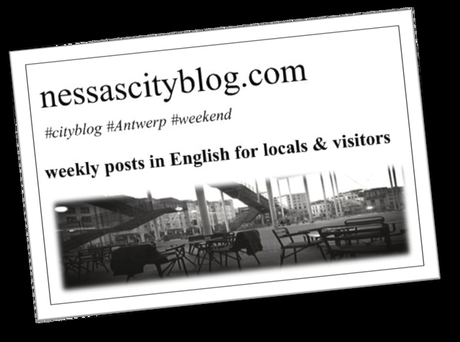Waking up on the morning of June 24th this year was -I imagine- a pretty grim experience for most British people living on the European mainland, myself included. Not least, because having been away from Britain for over fifteen years, I had not been entitled to vote in the referendum that would affect my status in the place I now consider to be my home.
I understand fully that the consequences for the 1.2 million Britons living outside the UK but within Europe, would most likely have been far from the minds of UK dwelling voters who do not have valued family connections to Europe – although it was pretty painful to learn that rights you had taken for granted had also been voted away even by people you thought of as your nearest and dearest. However, I did wonder what sort of image voters might have of us, were they fleetingly to consider who we might be. It seemed to me that on the few occasions when the media did reflect on this, it frequently involved invoking the stereotype of the retired or bar-owning British expat living it up around a beach in southern Spain, as depicted in pictures used in articles like this one or this one (which uses the same image) or here (there’s that Union Jack bedecked bar yet again!). I’d like to point out that this is far from reality for the vast majority of British people living in EU countries: we are nurses, builders, translators, wait staff, small business owners, teachers, civil servants, receptionists and many more regular jobs besides. We are working parents, stay-at-home-parents, single parents and ‘trailing partners’ (as the re-location literature so flatteringly terms those who accompany their working partners on international moves). We are single people, or couples, or busy families doing school runs, jobs, hoofing it round the supermarket, paying our bills… We are -for the most part- really NOT sunning our leathery beer bellies in Malaga, while refusing to learn a word of Spanish. Our lives -like those of people in the UK – consist of the usual unremarkable elements that form the basis of regular working days in the communities in which we live.
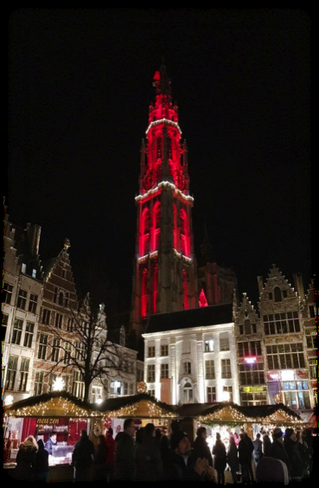
I arrived in Belgium in 2006, from the Netherlands, where I had been working for six years as a teacher. I also took up a teaching post on arrival in Antwerp, and this was the reason for my move here, with my (Dutch) partner, who is also a teacher, and my daughter, who was five at the time. My two youngest children were born subsequently (in 2008 and 2012) here in Antwerp, and attend local schools.
We quickly settled in, and came to appreciate living in Antwerp. What’s not to like? It’s a vibrant city where there is always something going on in the community. Over the ten years that we have lived here, we have enjoyed being part of city life, often through regular community public events laid on by Stad Antwerpen. These have become more familiar to us the longer we stay. Our lives have become punctuated by annual dates on the family calendar: Autovrijdag (car free day), Bollekesfeest (a beer festival), Zomer van Antwerpen (summer events program) and- as temperatures dwindle and the days grow shorter- Winter In A (winter and Christmas events). It’s a lovely city to visit, if you get the chance.
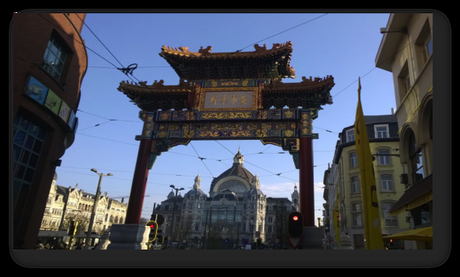
I haven’t lived in England since I was 18, and I left the UK from Scotland in 2000, but I never thought that having a British passport could become an impediment to accessing employment on an equal basis, or would complicate travel around Europe. I never thought that I would be voted into becoming a ‘non-EU citizen’. I suppose I am guilty of taking my European identity -and the belief that it would be reflected in the passport that I hold – completely for granted. Born in 1971, my life so far corresponds almost exactly to the period of UK EU membership.
So once the shock had dissipated a little, I began to think about what to do next. My eldest is going to be finishing her secondary education in a few years and may wish to apply for further education. That might be in Britain, but equally it might not; she might prefer to apply for a local course, or one in another EU country. It seems absurd that -as someone who has never actually lived in Britain, nor outside the EU -she was at risk of becoming a non- EU citizen. Maybe everything would be OK, but as the terms of Brexit seem so utterly confused and unclear (despite the recent -largely unsurprising- statement that the end of March 2017 will be the deadline for triggering article 50), I quickly felt inclined to start looking into gaining Belgian nationality so that future options remained as broad as ever they had been for myself and my family. If I had citizenship, it would automatically be passed on to my children. I would not need to give up my UK nationality, but it would not be recognised by Belgium. So I decided to request Belgian nationality, and what follows is what I discovered.Belgium’s regulations regarding citizenship are more lenient than many countries and a bit of Googling revealed that I was eligible to apply. Belgium requires that you have lived here, and that you provide evidence of ‘economic participation’ (i.e. earning and paying tax) over an unbroken five- year period. You can apply for citizenship if you have not been paying tax, but would need to have been resident for ten years in such a case. To apply, you need to demonstrate your period of residency, your employment status, that you have paid tax, that you speak at least one of the three languages of Belgium and that you are integrated.
Firstly, I needed to go to a legal translator to get a translation of my British birth certificate. This cost about 70 euros and took a few working days. I also had to get a letter from my employer, confirming that I have a permanent contract and stating the date when the employment began. I then set the printer to work, printing out all the tax documents which showed my ‘economic participation’ over the past five years, and salary slips for the current tax year, up to the time I began my application. Armed with all this, I went to the Districtshuis, where all of the documents were scanned and kept. The woman who assisted me was professional, efficient and helpful. She told me that I did not need to do an integration course or language test, as this is assumed, given the length of time I have been holding down a job here (I hope she is right, as I have a friend who has been told differently!). She then directed me to the Federal Fiscaal Overheidsdienst to get one more document that would cost 150 euros. I have subsequently come to understand that this is basically a fee for the creation of the dossier, but as you can see from the picture below… I was not clear about its purpose at the time…
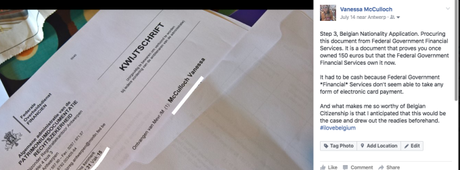
[This needed to be stamped of course. Anyone who has lived in Belgium for any length of time, will know that stamping things is Very Important Indeed, and that even in the digital age, there are few things that Belgian bureaucracy enjoys more than a bit of ‘stempelen’ on hard copies of … pretty much everything.]
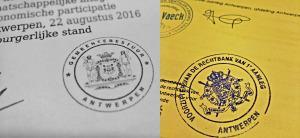
So I dutifully got those things and headed back to the Districtshuis. I saw the same efficient and helpful lady who was, once again, efficient and helpful. She chatted in a friendly way and did some more scanning.
And then she had me copy out this statement in my very best handwriting:
“Ik verklaar Belgisch staatsburger te willen worden en de Grondwet, de wetten van het Belgische volk en het Verdrag tot bescherming van de rechten van de mens en de fundamentele vrijheden te zullen naleven.”
(I declare that I wish to become a Belgian citizen, and to comply with the Constitution, the laws of the Belgian people and the Convention for the Protection of Human Rights and Fundamental Freedoms)
And I think it was at that point that something changed. I realised that I actively DID want those things. I wanted to be Belgian. Not in a fervent, flag-wavy way. Not in a national anthem, or a marchy boots way. Nor can I claim an exhaustive knowledge of Belgian art, history or politics. I simply like our life here, in Antwerp, Belgium, the EU, and I think that Human Rights are important. I had started the application as a bureaucratic, practical procedure -a rubber-stamping, as it were – to retain rights and freedoms for practical purposes, living in an EU country. But somehow copying out the words and signing them did cause a small sea change. I was reminded that I do indeed believe in those EU values. I find I am less attached to a specifically British identity than I thought I was. And Belgium has been good to us… this small, imperfect, often divided country, frequently maligned by stand-up comedians who probably haven’t been here (or who are short on material perhaps) as being … BORING (yep, you’ve heard the jokes, right?).
Well, whatevs, as they say. Needless to say, that is not a view of Belgium that I share. I’ve had confirmation that my dossier has been received and I am waiting for the decision – which is meant to take 4 months from that point. That would be the 22nd December -my Dad’s birthday. I am proud that he campaigned energetically for the Remain side, and we commiserate together frequently. It would be a good to be able to offer him the consolation that three of his grandchildren will retain -and no doubt benefit from retaining – their EU status. So not a day goes by when I don’t at some point think about my application, and that thought is always accompanied by a heartfelt hope that my it will be granted.
… But if you are interested to hear what happens next- stay tuned, and I’ll let you know as soon as I hear.
Additional links
http://www.expatica.com/be/visas-and-permits/How-to-apply-for-Belgian-citizenship_100133.html
http://www.bbc.com/news/uk-politics-eu-referendum-36046900
https://pixabay.com/ (EU flag image)
Christmas picture by Daniel Ruiz-Ceccenello -thanks!
